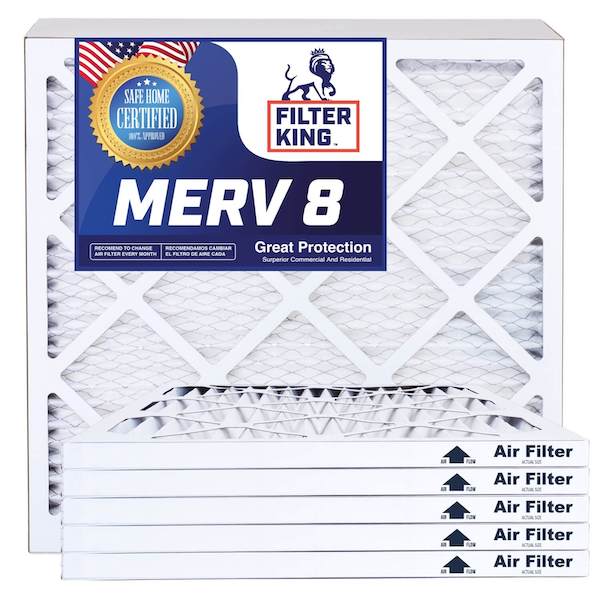FPR vs. MERV Rating: What’s best? Know the difference
A minimum efficiency reporting value (MERV) and a filter performance rating (FPR) are two ways to measure an air filter’s effectiveness. Understanding FPR vs MERV is hard. But since air filter’s play such a critical role, knowing about MERV ratings and FPR ratings will help you get the most out of your heating and cooling system.
MERV, MPR, and FPR Air Filters: What’s the difference?
There are several systems for measuring air filter performance. Each one uses different metrics for rating filters. The three ratings are among the most common:
- MERV: Developed by the American Society of Heating, Refrigerating, and Air Conditioning Engineers (ASHRAE), this rating measures residential filters. A good rating is usually above 10.
- MPR: The Microparticle Performance Rating measures how well filters catch particles smaller than one micrometer.
- FPR: This is a one-to-ten rating that Home Depot created.
Despite some differences, these systems all show a filter’s ability to capture particulate matter in the air.
What is Particulate Matter, and How Does it Get into the Air?
The term particulate matter refers to tiny solid and liquid particles that exist in the air we breathe. Particulate matter is often the result of chemical reactions and construction activity.
Smog and car exhaust are both among the many sources of particulate matter. The presence of these small particles can affect indoor air quality by increasing bacteria levels and triggering the lungs of those with asthma.
Particulate matter comes in many sizes and can be detrimental to human health. Since these pollutants are such a threat, a quality air filter is essential to a healthy home environment.
MERV Rating: The Industry Standard
The MERV rating system is one of the most common ways to rate air filters. This system measures how well a filter can capture particles of varying sizes.
What is MERV?
Micrometers, also known as microns, are the standard unit for measuring particulate matter. The MERV rating system uses this measurement as the basis for its filter evaluation.
This rating system has a tiered system. Each numbered tier represents a filter’s efficiency in capturing particles of different sizes, as measured in microns. A filter that can capture smaller particles at a higher rate receives a higher score.
Pros and Cons
MERV is the primary rating system for the air filter industry. It offers a clear indication of a filter’s ability to catch and hold particles. But look out for filters with an excessively high MERV rating. These filters can restrict airflow.
When should I use it?
Use a MERV rating when evaluating a filter for home use. A filter with a sufficient MERV rating will capture common household particles like dust, pollen, and mold.
MPR: Developed by 3M
The American Conglomerate 3M created the microparticle performance rating (MPR). This system uses high number values to represent filter effectiveness.
What is MPR?
Here is MPR meaning, Microparticle Performance Rating which measures how well an air filter can capture particles smaller than one micron. Look for a higher MPR, meaning a filter performs well. For example, a filter with a 600 MPR rating captures dust, while one with a 1500 rating can block smaller allergens.
Pros and Cons
MPR specifically details a filter’s capacity to capture distinct varieties of particulate matter. However, it only measures for particles between .3 and 1 micron. Since some common particles are smaller than that range, and MPR rating is not always the best indication of a filter’s quality.
When should I use it?
Use this system when you are trying to filter specific airborne particles. Match the MPR score to the type of particle that is of the most significant concern to you.
FPR: Used For Home Depot Products
Given the importance of air filtration, Home Depot developed its own rating system called a filter performance rating. This rating is relevant to any air filter that Home Depot sells, including Honeywell air filters.
What is FPR?
Regarding effectiveness, it is hard to choose between a MERV rating vs FPR ratings. Both are useful, but FPR may be easier to understand since it uses a number system that is more intuitive. FPR scores filter from one to ten, with ten being the best.
Pros and Cons
FPR is a simple system that gives a clear score. On the downside, it only applies to products you can find in Home Depot.
When should I use it?
Rely on FPR when you are shopping for a filter at Home Depot. In other cases, you will need to use one of the other rating systems.
Which Should I Use
For the average consumer, it is challenging to compare MPR to MERV or FPR vs. MP or even FPR vs MPR. But when in doubt, opt for a filter with an ideal MERV rating. MERV is the standard in air filtration and is a reliable system.
Are They Comparable?
Thankfully, you won’t need to make a long list of pros and cons for MERV vs MPR or spend hours comparing FPR to MERV. Instead, you can trust each of these ratings since they essentially measure the same characteristics of an air filter.
When Should I Change My Air Filters?
For the best air quality in your home, you need to change your filters regularly. Even if your filter has a fantastic MERV or FPR rating, you should change it every few months. Often, it is helpful to set a reminder for your air filter change.
Benefits of Frequently Changing Air Filters
Changing air filters often ensures that you are breathing clean air and that your HVAC system is working correctly. Frequent filter replacements can also reduce your energy efficiency, leading to lower heating and cooling bills.
Choose Filter King For Your Filter Delivery Service
If you are in need of a new air filter, look no further than Filter King. With Filter King, you can expect to find the highest quality filters at a reasonable price.
Fast Shipping Guarantee
Regardless of which filter you choose, Filter King can guarantee expedient shipping to your home. Shipping is also free and can follow an automatic schedule based on your rate of filter replacement.
Made in the USA
We supply filters of varying sizes to suit your unique air filter needs. All the filters we offer are made in the USA.
Buy More, Pay Less
Considering even the best filters need replacement, buying a single filter does not make sense. Instead, consider buying in bulk. Purchasing multiple filters from Filter King will save you money in the long run.
30-Day Money-Back Guarantee
At Filter King, we are confident in our products. As proof, we offer a 30-day money-back guarantee in the event that you are not satisfied with your filter purchase.

 14x18x1
14x18x1

